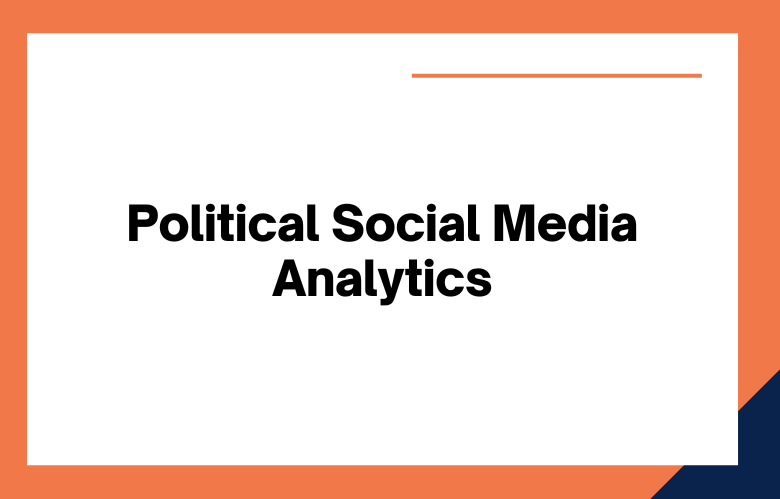It’s no secret that social media is a powerful tool for politicians. It connects with voters, builds support for policies, and rallies supporters. But how can you track the analytics of political and social media? You can find everything about political and social media analytics.
Are you looking to track the performance of your political and social media campaigns? Wondering which tools offer the best insights? This post will explore some of the most famous political and social media analytics options and show you how to get started.
Understanding which platforms resonate with your audience and tracking engagement metrics can make better-informed decisions about where to focus your efforts.
As we approach the upcoming presidential election, tracking and monitoring political and social media analytics is more important than ever.
By understanding how people are talking about the candidates on social media, you can better understand which issues are most important to them and how they feel about the candidates.
Using our powerful platform, we’ll show you how to track political and social media analytics. So whether you’re a candidate, campaign manager, or just interested in politics, read on for tips on getting started!
What is a Political Social Media Analytics?
Political and social media analytics collects and analyzes data from social media platforms like Twitter and Facebook to track and understand political conversations and sentiments.
This data uses to influence and shape political campaigns and help track the success of specific policies and politicians.
So, political and social media analytics is all about using data from social media to understand the political landscape.
Facebook. Twitter. They’re both hugely popular social media websites that people use every day. But what about when these social media sites use for political purposes? That’s where Political Social Media Analytics comes in.
Political Social Media Analytics is a branch of data analysis focusing on understanding how political actors use social media to achieve their goals. It could involve anything from analyzing candidate tweets during an election to studying the hashtag usage of a protest movement.
No matter the specific focus, Political Social Media Analytics provides a valuable tool for understanding the ever-changing landscape of digital politics.
Political and social media analytics studies how political organizations and actors use social media to achieve their goals.
This field of research is relatively new, but it’s already providing valuable insights into how politics and social media interact.
In today’s world, social media plays a significant role in people’s lives. It’s a way to stay connected with friends and family, share news and experiences, and voice opinions on current events. Many businesses use social media to communicate with customers and promote their products or services. And as we all know, politicians use social media to reach voters.
But what is “political, social media analytics?” Simply put, it uses data from social media platforms to track and analyze political activity and opinion. It helps politicians and other political actors better understand public opinion on specific issues, gauge voter sentiment in key election battlegrounds, and target their outreach efforts.
How to Track Political Social Media Analytics
In the modern political climate, social media analytics are more critical than ever for keeping track of the conversation. But with so many platforms and moving pieces, it can be tough to know where to start.
Here are some ways to get started tracking social media analytics for your next political campaign:
- Define your goals and target audience. What are you hoping to achieve with your social media campaigning? Who do you want to reach? Answering these questions will help guide the rest of your process.
- Figure out to focus on which platform or platforms. With so many choices out there, narrowing your scope to use your time and resources effectively is essential.
- Keeping tabs on what politicians are saying on social media can be tricky. Politicians always look for ways to communicate their message to voters, and social media is excellent. But with so many politicians active on social media, it can be challenging to know what’s happening.
- That’s where political and social media analytics comes in. By tracking what politicians say on social media, you can better understand what they’re up to and thinking. And that can help you make better decisions about your voting.
- Whether you are a campaign manager, marketing director, or small business owner, it is essential to understand how to track political and social media analytics. This process can help you better measure the success of your campaigns and adjust your strategy accordingly.
- To track social media analytics, look at the data from each platform you use. Look at each post’s impressions, clicks, and engagement. You can also look at follower growth over time.
- Once you have collected this data, you can look for patterns and trends. It helps you understand what works well and what could be improved. Adjust your campaigns accordingly to continue seeing the best results possible.
- To track political and social media analytics, follow these steps:
- First, create a social media listening platform. It is by setting up Google Alerts for key topics and issues.
- Next, set up Boolean searches to track mentions of candidates, bills, and other relevant topics.
- Finally, use social media reporting tools to aggregate data and get insights into what people say about politics online.
Ways to Track Political Social Media Analytics
- Use social media listening tools to track political conversations on social media.
- Analyze the sentiment of conversation around specific topics or candidates
- Identify influential voices in the conversation
- Track how often a candidate mentions and where those mentions are coming from
- Monitor platforms used to talk about politics the most
- Compare engagement rates between candidates’ social media accounts
- Analyze which topics are getting the most traction on social media
- Use Hootsuite Insights to track how your social media campaigns are performing and measure the impact of your efforts
- Use Google Alerts to track who is talking about your brand online and see what they’re saying
- Monitor Mentions on social media platforms to see all the places where people are discussing your brand
- Use Brandwatch to track not just who is talking about you but also what they’re saying
- Set up a Google AdWords campaign and use conversion tracking to see how many people click.
- Use social media listening tools to track political conversations on social media.
- Analyze the sentiment of conversations around different topics and candidates.
- Identify influential users and analyze their impact on the conversation
- Look at which topics are being talked about the most and see how this changes over time
- Track engagement with content- see what resonates with people and why
- Compare the performance of different platforms (Facebook, Twitter, Instagram) to see where best to invest your resources
- Monitor competitor activity and learn from them.
- Analyze Facebook Insights to understand how people are interacting with your page.
- Use Google Analytics to track website traffic from social media sources
- Monitor mentions of your brand or campaign on social media platforms
- Use Hootsuite’s Social Media Monitoring Tools to track online conversations about your brand
- Keep an eye on top influencers in your industry and follow their social media analytics
- Create social media reports to share with stakeholders.
- Google Analytics can help you track website visits from social media sources, including which platforms drive the most traffic.
- Hootsuite Insights offers data on who is talking about your brand on social media, what they say, and where they are located.
- Brand24 gives you real-time insights into who’s talking about your brand on social media and measures the sentiment of that conversation.
- Talkwalker lets you track global online conversations around specific keywords in over 180 languages.
- Use Twitter’s built-in analytics to track how many followers you’re gaining or losing, which tweets get the most engagement and more.
- Google Analytics can help you track website traffic, including where people are coming from (social media or other websites) and what pages they visit on your site.
- Facebook Insights provides detailed analytics about your page, including how many people see your posts, what type of content resonates with them, and more.
- Hootsuite Insights offers social media analytics for all your social media accounts in one place and insights into who’s talking about your brand online and what topics they’re discussing.
- Use Google Analytics to track website traffic from social media sources
- Sign up for Hootsuite Insights to measure how well your social media campaigns are performing
- Use Sprout Social’s analytics tools to see how your brand is on social media
- Install the Crimson Hexagon extension for Chrome or Firefox to analyze political conversations on social media platforms
- Use Brand24 to monitor who is talking about your brand on social media and what they’re saying
- Create a custom monitoring dashboard in TweetDeck that tracks specific keywords and hashtags related to your campaign
- Use Hootsuite Insights to measure how your brand talks on social media
- Use Brand24 to monitor online sentiment toward your brand or product
- Use Talkwalker to track how much reach your social media campaigns are getting
- Use Quintly to compare your social media performance against other brands in your industry
- Use Socialbakers for detailed insights into who is following and engaging with you on social media.
- Use social media listening tools to track sentiment around specific topics or candidates.
- Analyze engagement metrics (likes, shares, comments) to see which posts resonate with followers.
- Look at follower growth over time to identify whether a candidate gains or loses support.
- Compare the reach of different candidates’ social media accounts
- Use Google Trends to track how often people are searching for specific political terms
- Monitor which hashtags are being used most frequently in politics
- Use Twitter’s advanced search feature to analyze tweets by location, date, and keyword
- Set up email alerts to notify whenever a politician makes a statement.
Conclusion
As we head into the home stretch of this heated election season, understanding how social media impacts political campaigns is more critical than ever.
Several tools and services can help you track and analyze political and social media analytics.
Contact us today for Political Social Media Analytics Consulting if you want to keep up the curve in understanding online politics.
We offer comprehensive services to help you make sense of the data and use it to inform your strategy moving forward.
One way to get in touch is by filling out our online form on this site or give us a call at
+91 9848321284. Let’s work together today!











